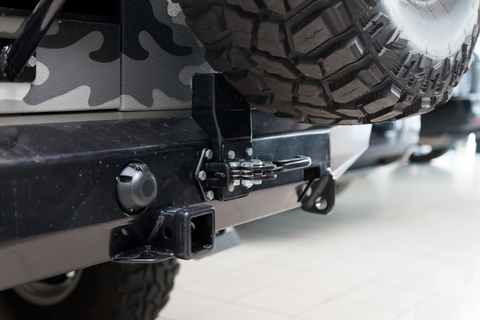Ask the right questions before getting hitched

The right marriage of hitch and automobile can keep your vehicle out of the shop. And it can help you drive safely whenever your vehicle pulls a trailer.
According to Bob Wesson, director of Center Sales and Operations for U-Haul International, towing items too large for your vehicle can cause damage to your transmission, engine and frame. The proper tow vehicle and towing system can help prevent accidents and damage to your vehicle.
"What you can tow depends on the vehicle and its tow rating," Wesson said. "Virtually any vehicle can tow however there are also limitations to every vehicle and towing system."
For instance, a small truck may not have proper cooling for the transmission or a hitch designed to support hauling large loads up and down steep grades. Vehicle manufacturers typically set towing limitations. Yet, every component of your towing system—such as the hitch, ball, ball mount and safety chains—also has a rating.
"Like links in a chain, your towing system is only as strong as the weakest link," Wesson said.
Problems can occur when a hitch or other any component of the towing system is not rated for the intended job, Wesson said. Perhaps your sedan was outfitted to pull a jet ski, and later you decided to haul a small to medium boat. The change may exceed your towing system's components, the car's tow rating or both. .
"We don't recommend welding hitches to the vehicle frame," Wesson said. "Such setups could possibly weaken the frame or result in damage to the vehicle's electrical components. For today's vehicles, we recommend only custom-fitted hitches that bolt to the frame, and usually use preexisting holes."
How do you make sure that you've got the right setup for your vehicle? Wesson suggested the following guidelines:
-
Get a good idea of what you want to tow and then look for the proper towing system. Researching this ahead of time may pay-off. Factor in limitations of your current tow-vehicle when shopping for your boat or trailer.
-
Ask the installer a lot of questions. Is your tow vehicle capable of towing a particular trailer? What are the weight limitations for your towing vehicle and towing system? Are their any weight limitations for the vehicle when hauling the trailer?
-
Find out about accessories that may assist towing or make towing safer. For instance, you may need additional lights to warn other drivers you are stopping or turning. Extended towing mirrors are inexpensive and can aid visibility. Installers may recommend a transmission cooler as part of a complete towing system to keep your vehicle from overheating.
-
Ask about warranties. You may be able to purchase inexpensive warranties on installation and products. Some may cover the cost of replacement in event of an accident. What type of warranty does the manufacturer or installation service offer? What types of damage or replacement does it cover? Is the coverage honored nationwide or at a single location?
-
Get quotes in writing. Comparison shopping can help you make a confident buying decision. Visit the installer's location if possible to get an understanding of what is being quoted and to ensure that you find the service best suited to your needs. This helps prevent misunderstandings or problems once the work begins. Price is only one factor; quality of workmanship and reliability are additional considerations.
"Drivers often don't think about the hitch until they get the boat or trailer," Wesson said. "By planning ahead you can ensure that you have the right tow vehicle and towing system for the job and are ready to take immediate delivery of your new boat or camping trailer.